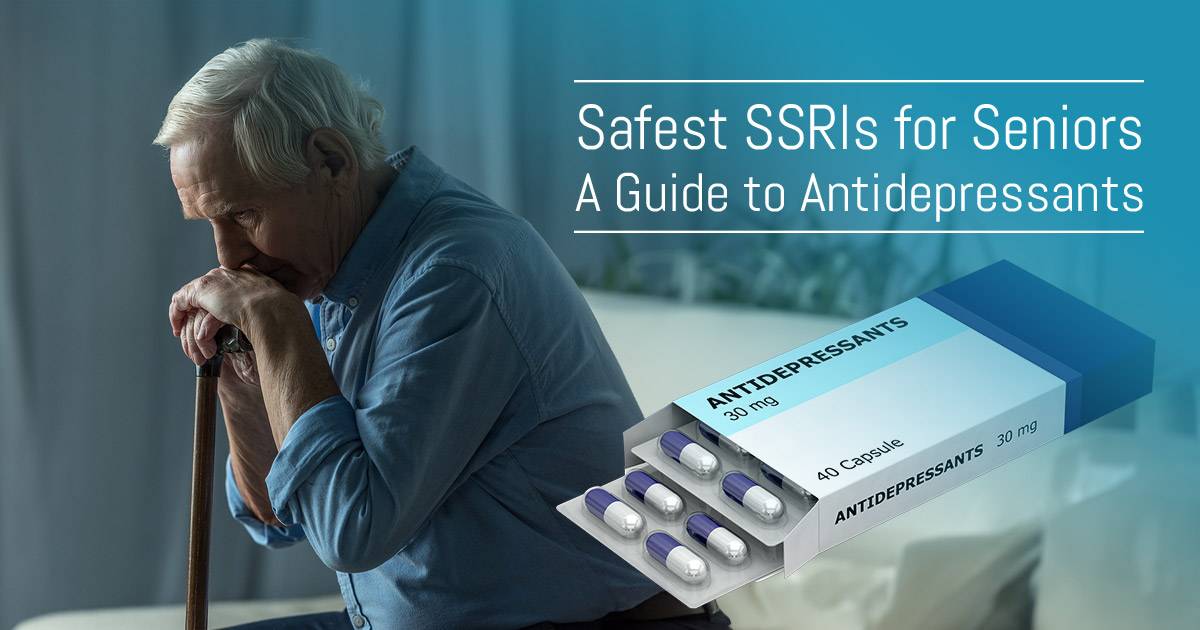Safest SSRIs for Seniors: A Guide to Antidepressants

As people age, depression becomes a common mental health issue, often overlooked due to its subtle presentation. Selecting the best SSRI (Selective Serotonin Reuptake Inhibitor) for elderly patients is a crucial part of treatment, as it requires balancing efficacy with safety. This guide will cover the safest SSRIs, symptoms of depression in older adults, and how to select the most appropriate treatment.
Depression in Older Adults
Depression in older adults can be particularly challenging to detect. While younger people may openly express feelings of sadness or hopelessness, elderly individuals might experience different or masked symptoms. In many cases, depression is mistakenly attributed to the aging process, leading to underdiagnosis.
Moreover, depression in seniors often coexists with chronic health conditions like heart disease, diabetes, or arthritis, further complicating diagnosis and treatment. The best SSRIs for elderly patients are those that minimize interactions with other medications and manage symptoms without causing additional health concerns. Safe treatment is vital because untreated depression can worsen these chronic conditions, leading to poor quality of life.
Signs and Symptoms of Depression in Adults
Depression manifests in various ways, especially among elderly individuals. Recognizing the following signs is important for timely intervention:
- Persistent sadness or low mood
- Lack of interest in previously enjoyed activities
- Significant weight changes
- Difficulty sleeping or excessive sleeping
- Feelings of worthlessness or guilt
- Fatigue or loss of energy
- Trouble concentrating or making decisions
- Restlessness or irritability
- Physical aches and pains without a clear cause
- Thoughts of death or suicide
Spotting these symptoms early and choosing the safest SSRI for elderly patients can improve their quality of life significantly.
How to Choose the Safest SSRIs for Geriatric Patients
When prescribing antidepressants for seniors, safety and effectiveness are key concerns. SSRIs are generally considered safe for older adults because they target serotonin without significantly impacting other neurotransmitters. However, careful attention must be given to potential side effects and drug interactions.
Several factors play a role in choosing the best SSRI for geriatric patients:
Consideration of Existing Medications
Older adults are often on multiple medications for various chronic conditions, and interactions between SSRIs and other drugs can pose risks. For example, Prozac (fluoxetine), while effective for many, can have more drug interactions compared to other SSRIs like sertraline or escitalopram. This raises the question: is Prozac safe for elderly patients? While Prozac is generally safe, it may not always be the best option due to its longer half-life and higher potential for interaction.
Individual Health Status
The physical health of the elderly patient should always be factored in when choosing an antidepressant. SSRIs like escitalopram and sertraline have a relatively low risk of causing heart issues, which is why they are often recommended for older patients with cardiovascular concerns.
Side Effects and Monitoring
Older adults tend to be more sensitive to side effects, so careful monitoring during SSRI treatment is essential. Drugs like citalopram and escitalopram are often preferred due to their tolerability and lower risk of side effects like confusion or dizziness.
Side Effects of SSRIs
While SSRIs are safer compared to older antidepressants, they are not without side effects. Common issues that may arise include:
- Nausea or upset stomach
- Fatigue or drowsiness
- Dry mouth
- Dizziness or lightheadedness
- Weight gain
- Sexual dysfunction
- Hyponatremia (low sodium levels), which is particularly dangerous in older adults
Hyponatremia is a notable concern in elderly patients. This condition, characterized by low sodium levels, is more prevalent in older adults and can lead to confusion, weakness, and even seizures. Regular blood tests and close monitoring are essential to catch any potential issues early.
Are Older Antidepressants More Toxic Than Newer Ones?
The comparison between older antidepressants (like tricyclics) and newer SSRIs reveals a significant difference in toxicity levels. Tricyclic antidepressants (TCAs) tend to have more severe side effects, particularly in elderly patients, including heart issues, cognitive impairment, and increased risk of falls.
SSRIs, on the other hand, are safer for geriatric patients because they have a much lower toxicity profile and fewer cardiovascular risks. For instance, citalopram and escitalopram are often considered the best SSRIs for elderly individuals, given their lower risk of causing serious health issues compared to older antidepressants.
Dosing for Older Patients
Dosage is another crucial factor in treating elderly patients with SSRIs. Seniors tend to metabolize medications differently than younger adults, often requiring lower doses to avoid side effects. Starting at a lower dose, such as 5 mg/day for escitalopram, and gradually increasing if necessary, is a common approach.
Additionally, regular assessments of the patient’s response to the medication and any side effects are important. If a patient experiences side effects or the medication is not working as expected, adjusting the dose or switching to another SSRI may be necessary. It’s also essential to educate caregivers and family members about the importance of medication adherence and monitoring.
Safest SSRIs for Seniors: Key Takeaways
When treating depression in the elderly, selecting the safest SSRI for elderly patients involves careful consideration of existing health conditions, possible drug interactions, and side effects. Sertraline, escitalopram, and citalopram are commonly recommended for their effectiveness and safety in this population. Although Prozac can be used, it may not always be the first choice due to its potential interactions. Monitoring for side effects like hyponatremia is critical for ensuring patient safety.
Choosing the Right SSRI for Elderly Patients
When it comes to managing depression in elderly patients, the right SSRI can make a significant difference. Selecting the best SSRI for elderly individuals involves weighing factors such as health conditions, potential side effects, and dosing requirements. Sertraline, citalopram, and escitalopram are often the top choices, offering a balance of effectiveness and tolerability. Regular monitoring and adjustments ensure the patient receives the best care, improving both mental health and overall quality of life.
